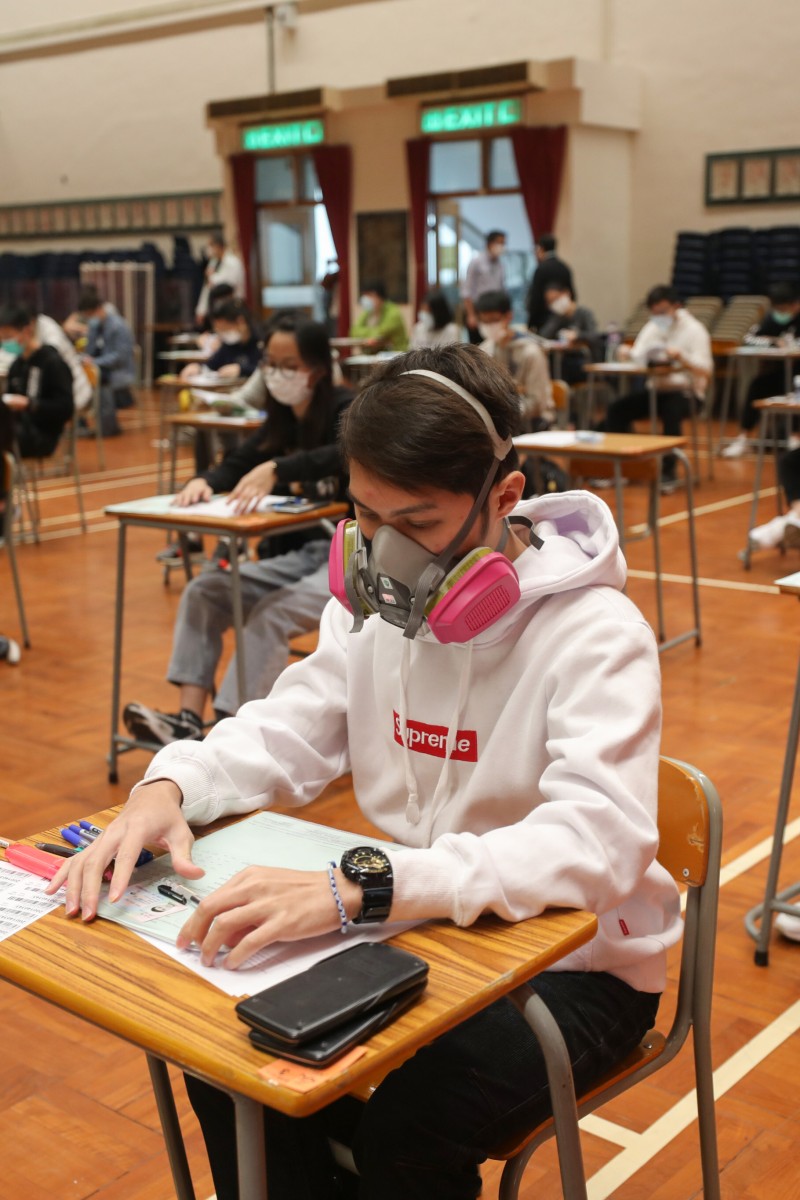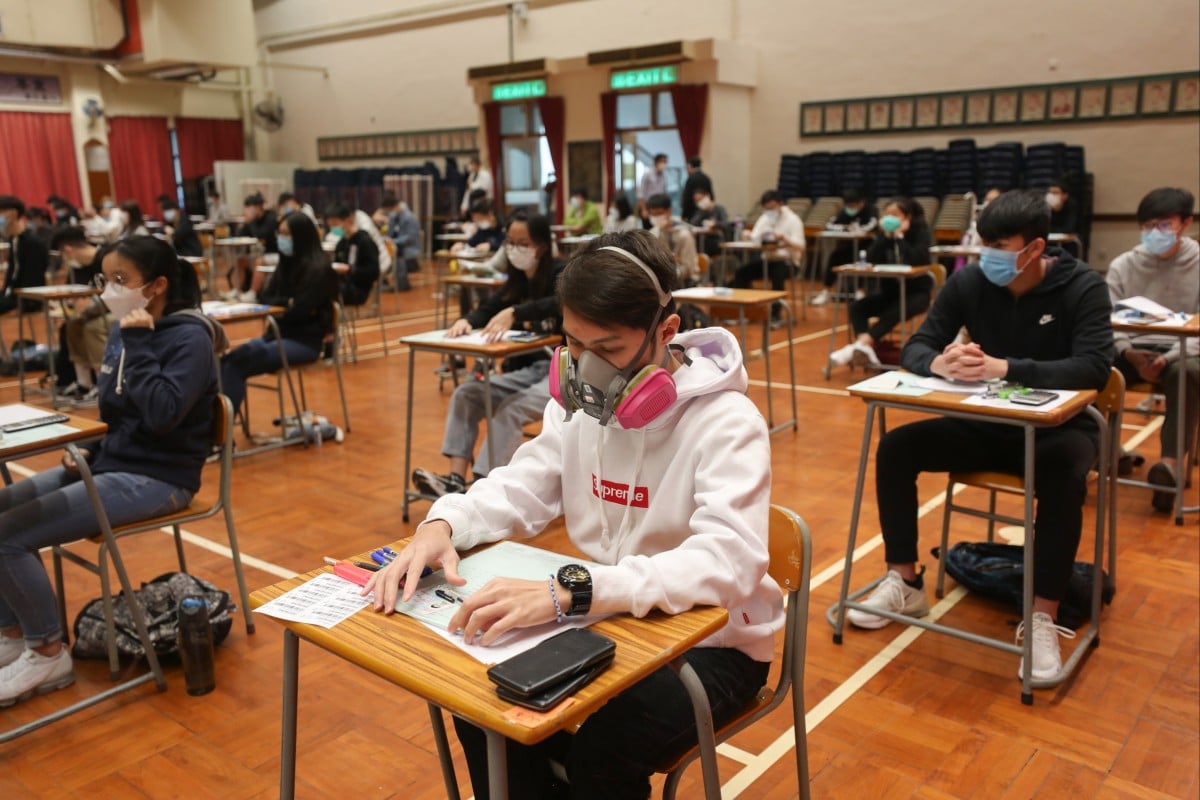
- Thousands of pupils are scheduled to take the city’s university entrance examinations at the end of the month, but many worry about what will happen if they get sick
- Meanwhile, the English Schools Foundation has said IB in-person exams are the best way to grade students, though a group of Island School pupils have voiced concerns
 This year’s DSE candidates face unique challenges as they have only attended about 180 days of in-person classes during this school year. Photo: Xiaomei Chen
This year’s DSE candidates face unique challenges as they have only attended about 180 days of in-person classes during this school year. Photo: Xiaomei ChenHot Topics takes an issue that’s being discussed in the news and allows you to compare different articles and viewpoints on the subject. Our questions encourage you to examine the topic in-depth and can be used on your own or with a friend.
Context: Most Hong Kong DSE candidates prefer postponing the exam, NGO survey finds
Hong Kong leader Carrie Lam Cheng Yuet-ngor said last month that Diploma of Secondary Education (DSE) exams would still be scheduled to start on April 22, if there was no rebound in Covid-19 cases.
Government authorities had earlier announced that DSE candidates would also need to test negative for Covid-19 using a rapid antigen test kit before sitting each subject. Those who are infected or under isolation orders will not be allowed to attend the exams.
However, results from a survey published on March 20 revealed most candidates preferred postponing the city’s university entrance exams. Many were worried about contracting the coronavirus.
The online poll was conducted by Youth New World, an NGO that serves low-income families and students in Hong Kong. It found 65 per cent of respondents wished to postpone the DSE exams. About 70 per cent expressed concern about getting infected during the test.
From March 4 to 18, the charity polled 352 Form Six students to understand their response to this year’s DSE arrangements amid the city’s fifth wave.
The survey also included questions related to sources of stress, which participants scored from zero to nine points. “Exam preparation under the pandemic” was rated highest with 7.58 marks. Other concerns included “worry about learning progress under Covid” (7.34), “cancellation of the DSE” (6.71), “getting infected” (6.65), and “postponement of the exam” (5.70).
Hong Kong schools must have 90 per cent student jab rate to return to full-day classes
Tong Wing-yiu, vice-chairman of Youth New World, noted that this year’s candidates were suffering from more stress than those from last year because they had fewer in-person school days.
“This year, students only attended school [in person] for about 180 days ... They have had the least time in school to learn and prepare for the DSE, compared to those from previous years,” said Tong, who taught in both primary and secondary schools for 20 years.
He added that authorities should also address students’ concerns about Covid-19.
“The government could arrange a special room for infected students to take the exam and announce the reliable rapid test kits for candidates to buy,” he said.
Sue Ng
Question prompts:
-
Based on Context and your own knowledge, identify and explain TWO challenges that this year’s DSE candidates may face.
-
What does the survey mentioned in Context suggest about respondents’ overall attitudes towards the DSE exams being held later this month, and why?
Hot Topics: Hong Kong’s plan to hire care workers from mainland China
News: Exam authorities consider special support for DSE students affected by Covid
Secretary for Education Kevin Yeung Yun-hung said last month that the bureau, exam authorities, schools and health experts were considering setting up special assessment centres for students sitting the Diploma of Secondary Education (DSE) exams who test positive for Covid-19 or are under isolation orders.
Authorities were looking into whether community isolation facilities were suitable for students who were close contacts of patients, as well as how many students would be able to sit the exams in an individual isolation room instead of an examination hall with their peers.
Last year, seven candidates who were close contacts of infected cases took their DSE exams at the Penny’s Bay quarantine camp. But this year, a wave of infections has forced education authorities to consider examination arrangements for many more students.
Asked what would happen to students who tested positive on the morning of their exams, Yeung said it “would be very difficult” to arrange closed-loop transport to bring infected students from an examination hall to a quarantine or isolation facility.
Responding to suggestions that one school per district could be set up as an “isolation exam centre” for students who tested positive on the day of their exam, Yeung said he had safety concerns about using campuses as accommodation for infected pupils.
“Our thinking is, if the student is infected or a close contact, then they should take the entire exam from an isolation or quarantine facility so as not to spread the coronavirus to teachers and other students,” Yeung said.
Hong Kong school heads call for special Covid measures for DSE students
Yeung pointed out that pupils should not take exams if they were unwell or had a fever as it would harm their health and might affect their performance.
Separately, the Hong Kong Association of the Heads of Secondary School said last month that those absent during exams should receive a fairer grade projection based on their school performance.
The education group said it hoped that the grading of all students’ exam papers would reflect the serious disruptions caused by the fifth wave, including for distinction levels of 5* and 5**.
Staff writers
Question prompts:
-
In News, identify THREE solutions proposed to help DSE candidates affected by Covid-19. Which of these is the best option in view of Hong Kong’s fifth wave, and why?
-
Refer to the last paragraph of News. Some argue that a more lenient grading system this year would be unfair to candidates who sat 2020 and 2021’s DSE exams. To what extent do you agree with this argument, and why?
Face Off: Is Hong Kong’s ‘early summer break’ a good move for students?
Cartoon
Question prompts:
-
In the cartoon, what do the words “if they fail the test, they might never recover” imply?
-
Based on your answer above, explain what the cartoon suggests about the government’s determination to go ahead with the DSE exams?
-
Identify ONE group mentioned in News that is most likely to agree with this cartoon.
Pandemic’s toll on Hong Kong pupils with learning disabilities
Issue: ESF students told exams in Hong Kong to go ahead as planned, despite candidate fears of catching Covid-19
Students at an international school group in Hong Kong will not be allowed to skip exams scheduled to start later this month, despite candidates voicing fears of cross-infection amid the city’s fifth wave of Covid-19.
A group of Island School students, part of the English Schools Foundation (ESF), argued last month that they should be allowed to take a non-exam route for their International Baccalaureate (IB) Diploma Programme.
In 2020, IB relied on internal grades to assess students when examinations were cancelled around the world during the early stages of the coronavirus pandemic.
ESF told the Post in response that in-person exams were the best way to grade students and that the foundation also adopted the same stance last year.
“If the pandemic situation at the time of the IB exams is such that students cannot safely undertake them, we have contingency plans we can put in place,” an ESF spokeswoman said, but did not elaborate on backup measures.
However, a Year 13 representative at the Island School, who asked to remain anonymous, said most of their 121 classmates had concerns about the decision to hold in-person exams.
“We believe that it is completely unsafe and, frankly, unacceptable for IB students in Hong Kong to be expected to undertake these examinations that begin in late April,” the student said.
Your voice: Hong Kong government should listen to students and teachers (short letters)
According to a survey of 114 Year 13 students conducted by their classmates last month, the representative said that 81.6 per cent wanted to take the non-exam route. The student leader added that it was inappropriate for the school to hold assessments at exam halls which had been deemed to carry a high infection risk.
A student said in the poll’s comments: “Many students will get sick [in the fifth wave]. This will affect their learning, studying, and they will be unable to perform to the best of their abilities. Carrying out the normal exam route would therefore be unfair to such students.”
Another student said: “Some of us live with elders or younger siblings who are unvaccinated, [so having contact with] so many people can be potentially dangerous.”
Yanni Chow and staff writer
Question prompts:
-
What was ESF’s response to the Island School students’ request for a non-exam route for their IB assessments? Using Context, News and Issue, suggest ONE argument for and ONE against ESF’s stance.
-
Why might the remaining 18.4 per cent of respondents who took part in the survey prefer taking in-person assessments? Explain using your own knowledge.
Hot Topics: Experts discuss if Hong Kong youth are really ‘lying flat’
Glossary
-
Diploma of Secondary Education (DSE) exam: Hong Kong’s local university entrance examinations that students sit at the completion of a six-year secondary education. It was first introduced in 2012. Most candidates take four core subjects (Chinese and English languages, mathematics, and liberal studies) and two or three elective subjects. In February, the Hong Kong Examinations and Assessment Authority said this year’s DSE exams could be postponed to mid-May or early June. If the epidemic situation remained severe by mid-May, the exam would be cancelled, and candidates’ DSE results would be based on their schools’ internal assessment marks.
-
English Schools Foundation (ESF): an organisation that runs 22 international schools in Hong Kong. It is the city’s largest English-medium organisation of international schools with seven secondary schools that offer the IB diploma programme. These include Island School, South Island School, Sha Tin College, King George V School, West Island School, Discovery College and Renaissance College.
-
International Baccalaureate (IB) Diploma Programme: a university entrance course for students aged 16 to 19. Students are assessed using a variety of methods, including examinations, essays, case studies, oral presentations, fieldwork, laboratory work, investigations and artistic performances.
-
5*; 5**: refers to the highest scores awarded to the two groups of best-performing candidates in Hong Kong’s DSE exams. The scores are for those who attain level 5 in any of the 24 Category A subjects, which include the four core subjects and 20 electives.
